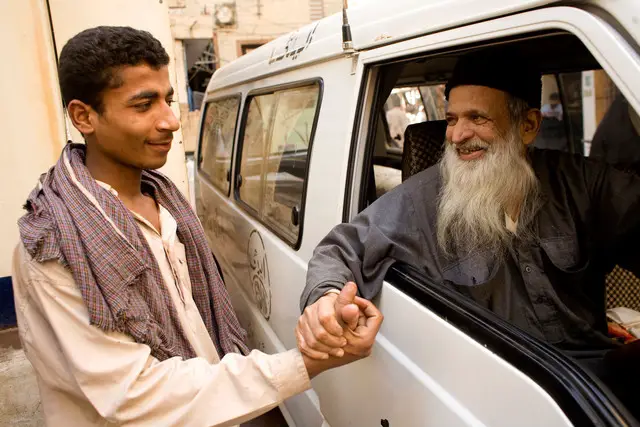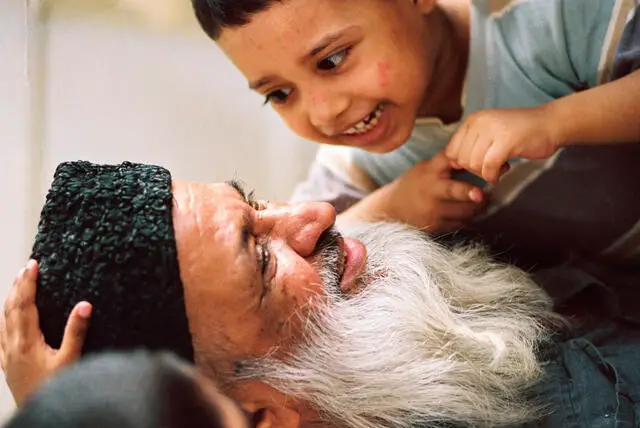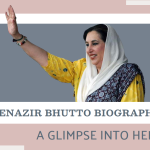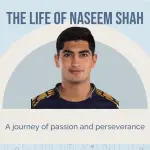Abdul Sattar Edhi dedicated his life to building Pakistan’s largest volunteer ambulance network and providing welfare services to the poor. Born just before partition in 1928 in Gujarat India, Edhi’s family later migrated to Karachi, Pakistan where he spent decades building his philanthropic Edhi Foundation into worldwide prominence before passing in 2016. His selfless contributions to caring for the destitute, drug-addicted, mentally ill, and disaster victims established Edhi as Pakistan’s most respected social reformer.
This extensive biography covers key aspects of Abdul Sattar Edhi’s 88 years of improving lives through humanitarian efforts:
- Humble beginnings in newly formed Pakistan
- Family migration hardships after partition
- School struggles to evolve personal philosophy
- Emergence of the first ambulance services
- Expanding emergency medical aid nationwide
- Broadening focus on the welfare program scale
- Global response capacity to catastrophes
- Iconic ascetic lifestyle centralizing service
- Relentless drive sustaining the Edhi Foundation
- Enduring humanitarian legacy as Angel of Mercy
Edhi’s journey of empowering impoverished communities through access to healthcare, rehabilitation, education, shelter, and child welfare programs demonstrates the scale of impact one dedicated person can achieve. This biography celebrates Abdul Sattar Edhi’s incredible life.
Early Life in Gujarat Before Pakistan’s Independence
Abdul Sattar Edhi was born in Bantva, Gujarat, India on February 28th, 1928. As British-occupied India roiled amid independence movements, Edhi’s family lived a comfortable middle-class life running a small clothing business in their northwest region hometown.
Young Edhi’s mother instilled pious discipline through regular madrassa schooling focused on Islamic studies and reciting Quran verses. But by his early teens, Edhi had developed a distaste for religious divisions as Hindu-Muslim tensions escalated violently. These influences shaped philosophies around humanitarian service needing to transcend religious affiliations which Edhi would later embed into all programs.
As the subcontinent partitioning crisis peaked in 1947, the Edhi family joined over 5 million other Gujarati Muslims fleeing deadly riots by resettling east into Pakistan’s largest city, Karachi. This stark transition exposed teenage Abdul Sattar to deeper levels of human anguish that came to define his life’s calling:
- Born in India in 1928 before Pakistan’s independence
- Middle-class upbringing in the Gujarat region
- Mother imparted Islamic madrassa schooling
- Developed doubts regarding religious divides
- Family forced to flee deadly 1947 riots
- Arrived as refugees in chaotic Karachi
Their first years in unfamiliar Karachi living in temporary housing as displaced migrants left an indelible mark on Abdul Sattar Edhi’s views around social responsibility that bloomed into full ambition just a few years later while discovering his life’s purpose…
Transformational Experiences Finding His Calling
In 1951 while selling cloth at Karachi’s Lamington wholesale market to support his family, a tragic accident scene outside shook Edhi’s conscience. A young student had been struck by a car and badly mangled with injuries across his limp body. But passersby simply glanced with indifference because touching blood would ritually defile them.

Edhi rushed out with bandages and cotton, having trained in first aid from his mother’s advice. He stabilized the youth until help arrived. This moment awakened Abdul Sattar to his higher humanitarian purpose. He took over managing operations at a tiny dispensary facility nearby where he slept nights treating the poor which local doctors ignored.
Over months of volunteering medical services, Edhi envisioned establishing an emergency ambulance fleet with phone dispatch infrastructure modeled on what he observed abroad. Lacking personal wealth, Edhi motivated the community to donate an old Suzuki van which he repaired into the first ambulance christened “Poor Man’s Van” proudly adorned with welfare contact phone numbers.
- Witnessed indifference to a bleeding accident victim
- Personal health training from his mother
- Took over a neglected local clinic for poor
- Volunteered nights treating ignored patients
- Inspired the community to donate an old van
- Repaired into the first “Poor Man’s Van” ambulance
This simple Suzuki van marked humble beginnings snowballing into Pakistan’s largest philanthropic welfare network as Abdul Sattar Edhi spent the next 60+ years refusing to stop helping others in need…
Building Nationwide Emergency Services
Throughout the 1950s and 60s, word spread regarding Edhi’s ambulance services manned by volunteers providing quick medical response including oxygen, IVs, and speedy transport to city hospitals willing to help. Donations slowly expanded his fleet from that single repurposed van into a full humanitarian organization named the Edhi Foundation.
As an increasing share of Pakistan’s impoverished and ostracized came seeking aid, the Edhi Foundation expanded into additional welfare assistance funded entirely from grassroots community goodwill and private donors refusing outside organizational sponsorship to maintain independence.
By the late 1960s, the foundation operated maternity wards, nursing education, orphanages, shelter accommodations, food kitchens, prisoner release support, and remains processing of unclaimed deceased. All falling under the personal mantra lived by Abdul Sattar Edhi through his signature black hat and tunic – “Think of the welfare of others before thinking of your own.” –
- Word spread locally of Edhi’s emergency medical response
- Donations allowed growing ambulance fleet resources
- Formalized Edhi Foundation welfare organization
- Added clinics, schools, and orphanages to meet the needs
- Prisoner and burial assistance programs by the late 1960s
- Grassroots community funding powering expansion
His ambulance fleet size eclipsed well-funded state-run competitors through citizen-fueled donations alone, directed fully into services instead of bureaucratic waste. And the surge continued…
National Expansion of Edhi Foundation Services
By the 1970s, the Edhi Foundation had become Pakistan’s preeminent emergency rescue organization led by Abdul Sattar deploying over 100 ambulances nationwide from fully equipped stations in most urban hubs staffed by EMT-trained volunteers coordinated via radio dispatch.
Edhi personally maintained central oversight sleeping minimally to review logbooks, handling difficult cases needing approvals, assessing supply inventories, speaking with media to promote work, and making appearances boosting visibility.
This period saw the Edhi Foundation expand into air ambulance helicopter wings and free housing kitchens feeding up to 30,000 daily across Pakistan through grassroots community kitchen models resourced from local businesses. Programs ultimately stretched providing aid globally.
- Edhi Foundation deployed a national ambulance fleet by the 1970s
- 100+ EMT staffed stations covering Pakistan’s cities
- Added air wing medevac helicopters to reach remote areas
- Launched free kitchens eventually feeding 30K daily
- Rapid growth fueled exclusively by grassroots support
- An international relief response would follow…
Truly embodying the ascetic worldview he preached, Abdul Sattar Edhi lived wearing a meager tunic with just a few personal possessions in his spartan room within one Karachi ambulance hub. From this base position coordinating 10,000 workers, Edhi built global aid capacities…
Expanding into International Disaster Assistance
The Edhi Foundation brought Abdul Sattar great pride when expanding emergency response teams internationally to disasters like the 1988 Armenian earthquake, the 2001 Gujarat quake, the 2005 Katrina hurricane, the 2010 Haiti earthquake, and the 2014 Philippines typhoon driving millions into homeless tragedies.
Edhi ambulances were often first arriving through uniquely mastered logistics rushing supplies and volunteers into chaotic voids otherwise plagued by delays in the early days following cataclysmic events. Through these relief missions and amplified media coverage, Abdul Sattar Edhi’s reputation grew to saintly levels.
By the early 1990s, over 1,800 Edhi ambulance centers operated nationwide as the media finally crowned Abdul Sattar with apt “Angel of Mercy” praises. Edhi simply continued habits like personally washing bodies of unclaimed deceased well into his late 80s with amazing stamina – rising at dawn for prayer before reviews and more hands-on work.
- Deployed aid teams to global disasters by the 1990s
- 1988 Armenia quake, 2001 Gujarat quake responses
- 2005 Katrina, 2010 Haiti, and more relief work
- Mastered rapid reaction logistics capabilities
- Managed over 1,800 centers across Pakistan
- Media praise as deserving “Angel of Mercy”
Honors accumulated including Pakistan’s Nishan-e-Imtiaz Order of Excellence along with numerous humanitarian nominations remaining secondary to the central mission of aiding others through welfare action.
No Stopping the Angel of Mercy
Even entering his late 80s and 90s, Abdul Sattar Edhi maintained dawn to midnight schedules – praying, planning, motivating teams, reviewing logbooks, and personally picking up bodies others deemed too “dirty”, an effort he considered his “real job”.

Mere weeks before passing at 88 years old in July 2016, Edhi was hospitalized after refusing rest to join relief efforts helping victims of a Pakistan Taliban bombing. Until the absolute end, service filled Edhi’s waking breath as he transformed into a global human rights icon through exceptional drive.
His wife Bilquis, nurses, and administrators vowed to continue the growing Edhi Foundation’s vital community programs long beyond the man himself who inspired its birth – a final gesture Abdul Sattar Edhi would have smiled at while re-affirming that persistent service, not symbolic figureheads, comprise the essence of humanitarian grace
- Worked intensely into the late 80s without slowing
- Still rose at 4 am for long devoted days
- Personal habits like washing unclaimed bodies
- Joined relief efforts weeks before death at 88
- Global icon but remained focused on service
- Foundation continuation secured his legacy
Few individuals advance so vast a social uplift through combined ambition, logistical mastery, and unrelenting stamina as Pakistan’s Angel of Mercy, Abdul Sattar Edhi…
Enduring Legacy as One Man Philanthropic Force
Long after his passing, Abdul Sattar Edhi’s story delivers profound inspiration to make selfless service the purpose of living. Key philanthropic achievements stemming from personal drive include:
| Achievement | Impact |
|---|---|
| 4000+ Edhi ambulances deployed | Saved over 1 million lives through quick response |
| World’s largest volunteer ambulance network | Reporting over 20,000 calls monthly |
| 300+ welfare program centers nationwide | Providing food, education, shelter, orphan care |
| Over $10 million was personally raised | All funding directly supported operational costs |
| 28,000 abandoned babies saved | Via orphanages with cradle baby hatch door systems |
| Global humanitarian landmark status | Household name assisting refugees and disaster victims |
Beyond statistical measures, Abdul Sattar Edhi’s self-sacrifice ethics and ability to motivate fellow citizens into humanitarian action birthed a blueprint for uplifting societies by addressing poverty sources instead of symptoms. His Nobel Peace Prize nomination only formalized the repute Mr. Edhi humbly dismissed in favor of continuous focus on serving vulnerable groups through organized compassion.
The Edhi Foundation perseveres as Pakistan’s frontline safety net catching vulnerable segments requiring emergency aid, shelter nourishments, adoption services, rehabilitation programs, and advocacy support through 300+ centers funded predominantly by civil-level donations – an extraordinary apparatus energized by one modest man unwilling to overlook suffering. That peerless legacy lights the Angel of Mercy’s memory.
Final Thoughts on an Inspiring Life Well Lived
Abdul Sattar Edhi compressed selfless intensity into 88 remarkable years bettering Pakistani society by building its largest welfare network benefiting millions to date. His rags-to-icon journey revealed the exceptional outcomes possible when fully devoted to uplifting others over chasing individual wants.
At an age when most retire from service, Edhi tripled down efforts through his twilight years, directly rescuing victims even on his deathbed. This profound conviction transformed Abdul Sattar into the household personification of humanitarian grace – Pakistan’s Angel of Mercy.
Edhi’s story calls for all to enact changes within immediate reach by heeding conscience and addressing overlooked suffering through action vs comfort of avoidance or mere sympathies. He redefined standards around poverty redress by simply doing instead of pondering shoulds. The model Mr. Edhi actualized continues opening access so others can meet basic dignities in an unrelentingly compassionate manner.
If more individuals stir themselves in service of outcast populations, even modest goodwill gestures accumulate exponential social impacts over time, as Pakistan’s Abdul Sattar Edhi demonstrated worldwide for six astonishing decades. Just imagine the progress possible if each of us rallied similar relentless devotion towards uplifting downtrodden groups within our respective communities. The Angel of Mercy’s legacy can live on through anyone willing to carry forth that enduring torch of hope.








